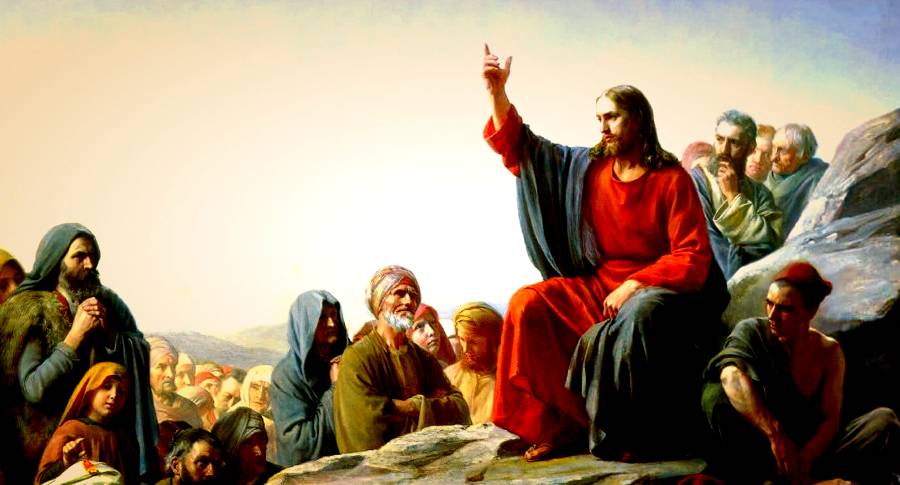-
•
•
32 responses
There are some pretty major aspects of our Latter-day Saint faith–and of Christianity in general–that I don’t really understand. Specifically: the necessity and efficacy of the Atonement. Repentance and forgiveness make sense to me. The Atonement is a mystery, and none of the explanations or theories resonate with me on a deep, personal level. I am convinced that the scriptural accounts–especially in the Book of Mormon and New Testament–are true. I believe what they tell me. I just don’t understand them. What I do feel, and feel viscerally, is the fundamental brokenness of the human condition generally and my own… Read More
-
•
•
8 responses
I remember seeing a survey several years ago that claimed that the two most popular hymns among Latter-day Saints were “I Stand All Amazed” and “Come, Thou Fount of Every Blessing”. I have not been able to find that survey online in recent years, but the latter hymn would be an interesting case, since it is not included in the current English hymnbook published by the Church of Jesus Christ of Latter-day Saints. I am pondering on hymns that may find their way into the new hymnbook, however, and there seems to be a lot of interest in the hymn… Read More
-
•
•
12 responses
A couple of weeks ago, we reached the end of 3 Nephi 26 in our family scripture reading. It’s the culmination of Jesus Christ’s ministry to the New World and the founding of Zion. I’ve always been fascinated by Zion, and especially by the practical side of it. The concept sounds so utopian, but we’re supposed to be building a real Zion down here. How? I wish I knew, but the scriptures seem so tantalizingly silent on the details. In 3 Nephi 26, we get one of the hallmarks of Zion in verse 19: And they taught, and did minister… Read More
-
•
•
16 responses
-
•
•
8 responses
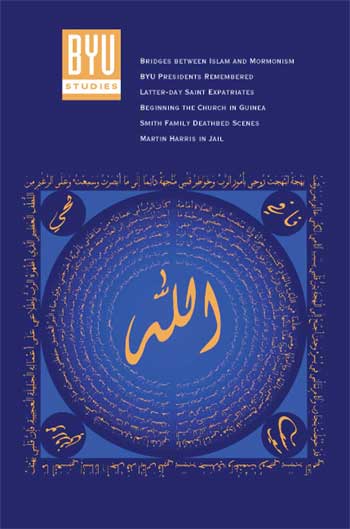
I know that I am a better Mormon on account of Muslim friends and hope that they will be able to say the same of me. Read More
-
•
•
9 responses
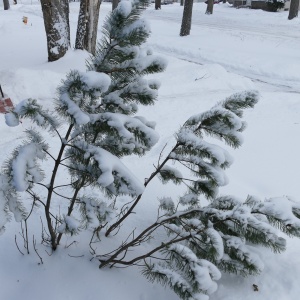
We still don’t know what to call our family meeting. “Home church” seems to be winning. Read More
-
•
•
45 responses
These are interesting times for linguists. Church leaders and administrators are working to change names in order to emphasize the correct name of the Church of Jesus Christ, as asked by the First Presidency. A main question is semantic: to what extent will the overuse of Jesus Christ lead to a devaluation of its meaning and sanctity? For example, what will be the effect of the perception of Jesus Christ as it is now included as jesuschrist in churchofjesuschrist.org as domain name for tens of thousands of mundane email addresses and web pages? Compare with how Muslims handle the name… Read More
-
•
•
32 responses
Innumerable blog posts and not a few books have been written in the last few years about faith crises and doubt as the Church and our Secular Age collide. The Church understands that facts on the ground are changing and that–in order to accomplish eternal objectives–tactics need to shift to accommodate the new reality. The clearest example of this is Elder Ballard’s address: The Opportunities and Responsibilities of CES Teachers in the 21st Century. In the piece, Elder Ballard extols use of the Church’s new Gospel Topics essays–which cover sensitive and difficult topics like race and the priesthood and Heavenly… Read More
-
•
•
55 responses
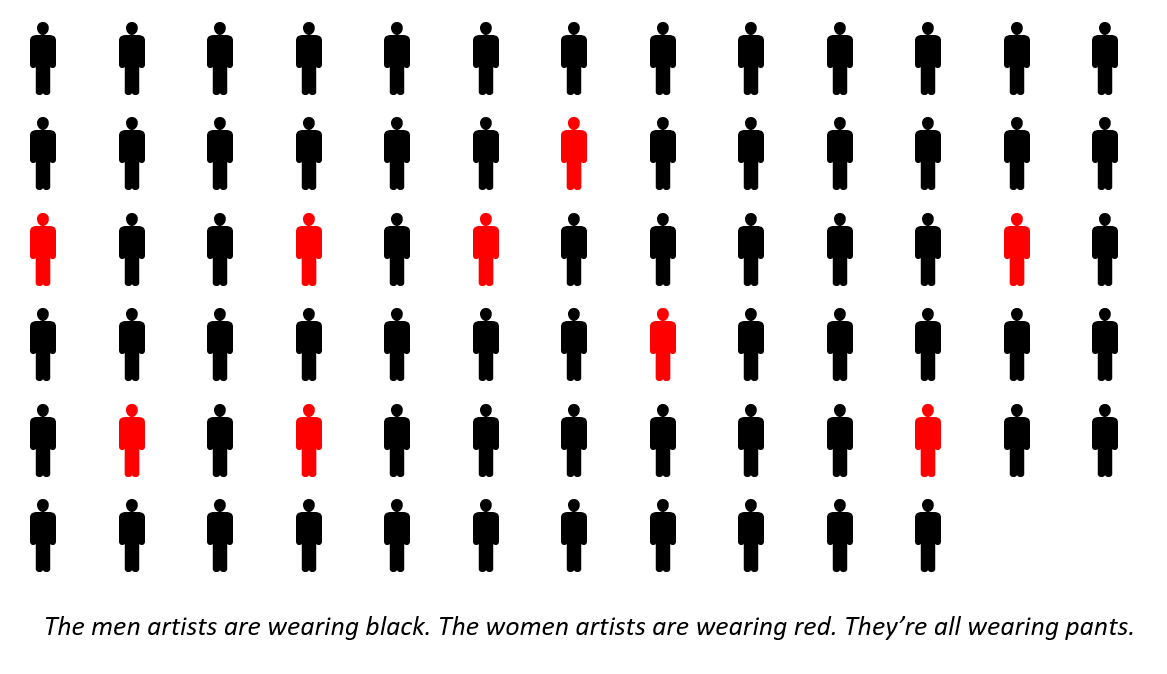
As I started preparing family lessons using the Church of Jesus Christ of Latter-day Saints’s new Come, Follow Me manual, I was struck by the quantity of art. In addition to photos and screenshots from Church-produced videos, the manual includes 78 reproductions of paintings or stained-glass windows. Many lessons – particularly in the first half of the year – include two or three paintings. But as I started going through the art, noting the artists, I saw a pattern: Brent Borup, Del Parson, Walter Rane, Dana Mario Wood, Walter Rane, Tom Holdman, Greg K. Olsen, Robert T. Barrett, Jorge Cocco,… Read More
-
•
•
The Society for Mormon Philosophy and Theology will hold a conference at the University of Utah, March 14-16, on the theme, “More Nations Than One: Theology, Culture, and Pluralism.” The Book of Mormon presents a highly inclusive vision of God’s love and his work to redeem all humankind, affirming that “the Lord esteemeth all flesh in one” (1 Nephi 17:35). Yet distinctions among cultures appear to retain a meaningful role in God’s work, since he teaches them “of their own nation and tongue,” according to what “he seeth fit that they should have” (Alma 29:8). What role does the variety… Read More
-
•
•
24 responses
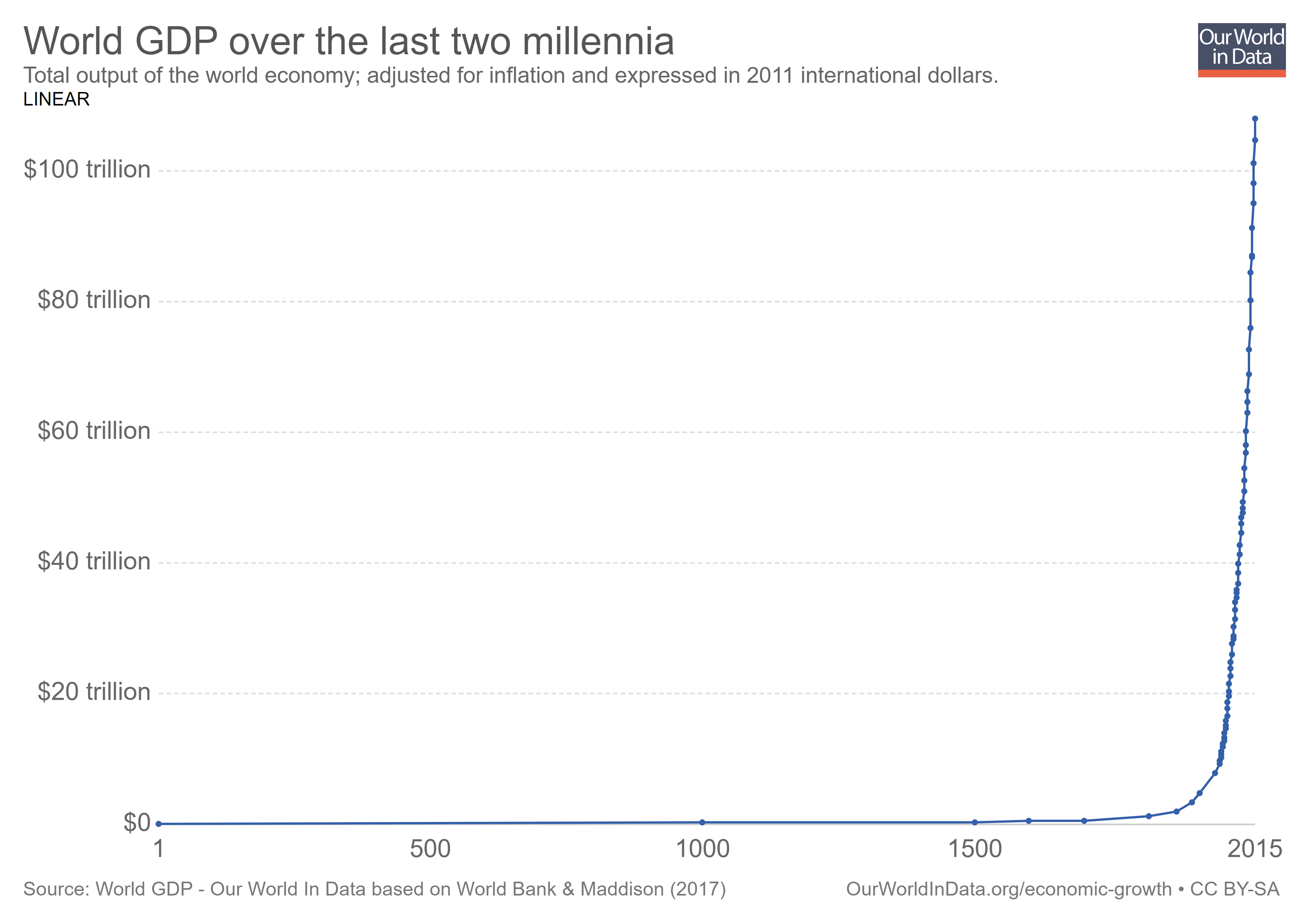
The chart above estimates the per-capita GDP of the entire world over the last 2,000 years. There are all kinds of problems with estimating GDP over such a long time-horizon, but the only thing that matters for the purposes of this post is the general shape of the graph. At the time of Christ, there was essentially no growth in per-capita GDP. At our present moment in history—and going back to before the Industrial Revolution—there is very, very steep growth in per-capita GDP. If you live at a time when there is essentially no growth (on a per-capita basis) then… Read More
-
•
•
25 responses
As some of you may have seen, the Church recently released two new doctrinal and historical essays. One is on Masonry and the other on Book of Mormon Geography.[1] Both have a prominent “beta” in the upper left so they may be revised over the following months. LDS Living wrote up a bit on the Masonry article. I am going to assume most of you have read them. Here are a few thoughts on the Masonry essay. Read More
-
•
•
55 responses
Latter-day Saints don’t watch R-rated movies. This is one of those specific, concrete directions that has an amazingly long half-life. It’s such an embedded aspect of LDS culture that I have no memory of being told it for the first time. The upside of specific, concrete admonitions like this is that they are easy to understand, easy to remember, and easy to apply. This means they can have a great and lasting impact on the behavior of the Saints. The downside of specific, concrete admonitions is that their clarity and simplicity can enable dereliction of duty. Practical admonitions are intended… Read More
-
•
•
2 responses
An other of our co-posts with Kurt Manwaring is here. This is 10 Questions with Susan Easton Black. Black has written some great books over the years and contributed a lot to apologetics as well. I’ve given friends many copies of her 400 Questions and Answers about the Book of Mormon. It’s a great entry to get people thinking about the Book of Mormon and answering some basic questions. However her publishing history is pretty huge and well worth checking out. Her most recent book is Martin Harris: Uncompromising Witness of the Book of Mormon written along with Larry Porter.… Read More
-
•
•
21 responses

Earthly Parents is the pen name of the author of And It Was Very Good: A Latter-day Saint’s Guide to Lovemaking. He agreed to share some of the book’s background here. * * * On the top of my parent’s bookshelf, far above the white-spined World Book Encyclopedias I read as a child, sat a thick, black book. That book wasn’t the World Book Encyclopedia. That book was called Everything You Wanted to Know About Sex but Were Afraid to Ask. Read More
-
•
•
5 responses
We sometimes speak of the idea of a holy envy—meaning something that we admire in another a religion. For years, while remaining active in my ward, I spent a considerable amount of time at a Presbyterian Church ringing English handbells. Over time, one feature of their worship that I developed a bit of a holy envy for is their use of a liturgical calendar. The liturgical calendar is an approach to remembering Christ’s life throughout the year. In Christian traditions that follow a calendar, the year is divided into a series of seasons with specific moods, theological emphases, and modes… Read More
-
•
•
One response

If you want to reach an audience of church members on a sensitive topic, watch and learn from Earthly Parents. Read More
-
•
•
63 responses
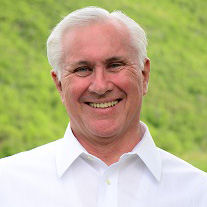
Brant Gardner has kindly agreed to offer some comments on the recent Church essay on Book of Mormon geography. He’s a research assistant with Book of Mormon Central and arguably one of the top experts in the question of Book of Mormon geography. I’ve enjoyed discussing the Book of Mormon with Brant going way back to the 90’s when I ran the old Morm-Ant mailing list to discuss ancient history as it related to Mormon scripture. Since then Brant’s published some groundbreaking work. I think his The Gift and Power: Translating the Book of Mormon is the main sustained overview… Read More
-
•
•
10 responses
I’m pleased today to share a guest post from friend of the blog, Samuel Morris Brown. A related symposium on “Faith in a Secular Age” will be held March 1 & 2 at Brigham Young University. Sam Brown, myself, and T&S emeriti Nate Oman and Jim Faulconer, together with other fine scholars, will speak. The symposium is free and open to the public. We live in an odd time. Most of us feel that something big is happening, something that matters. What we identify as the oddity may be as variable as our interpretations of a Rorschach inkblot. Culturally we… Read More
-
•
•
37 responses
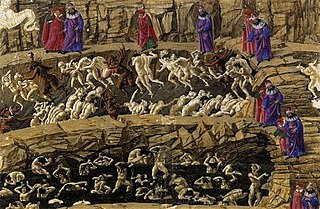
If Satan hired a Russian troll farm, what would the Mormon corner of the Internet be like? Read More
-
•
•
2 responses
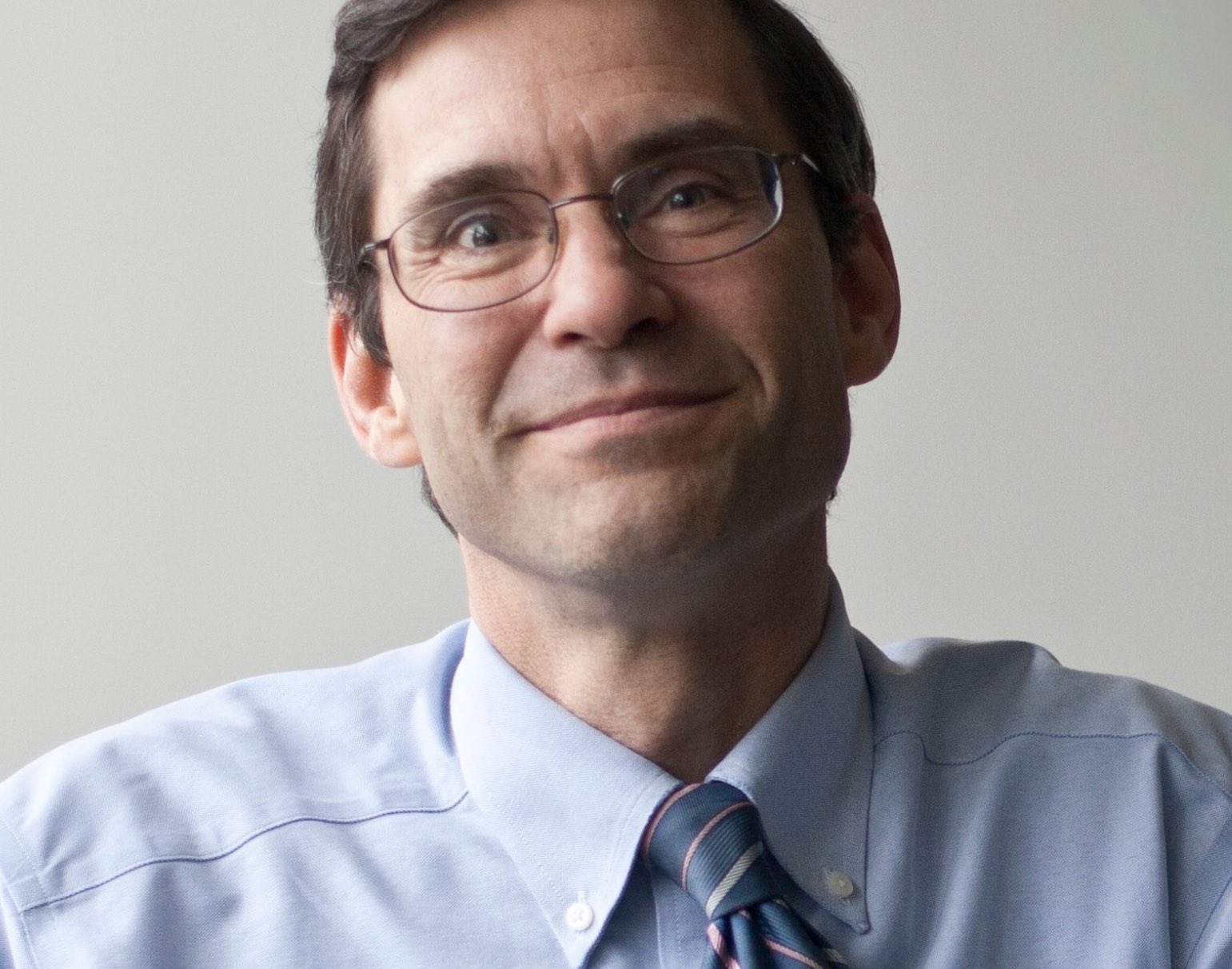
We’re happy to share an other in our series of interviews by Kurt Manwaring. This week’s is his interview with Grant Hardy. He’s the author of the recently released The Book of Mormon: Maxwell Institute Study Edition. Kevin Barney recently reviewed that study edition. Prior to that he was well known for the Book of Mormon: A Readers Edition which nicely formatted the Book of Mormon into paragraphs following the original text. The new Maxwell Study Edition builds on that adding extensive notes and making use of Royal Skousen’s work on a critical text. Grant teaches Chinese history at University… Read More
-
•
•
5 responses

Back when I first was invited to join T&S I started doing a series on Hell in the Book of Mormon. This is a long delayed follow up. Previously I’d discussed the three broad categories of how hell has been viewed theologically and vulcanism metaphors in the Book of Mormon. This time I want to start focusing on the metaphors and typology used to deal with hell in the Book of Mormon with a focus on Egyptian conceptions of hell.[1] Read More
-
•
•
22 responses
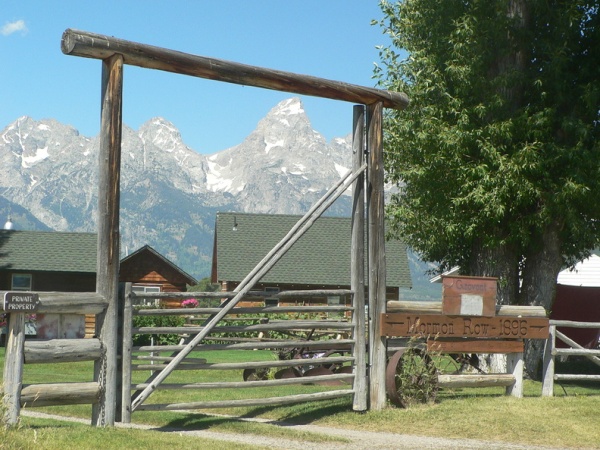
Avoiding controversy would make our lives easier, but it would not be good for the church. Read More
-
•
•
6 responses
One of the interesting questions about the plan of salvation is why we need to think we’re going to die. Clearly death has an important role in our development, but why? I came upon a great interview with Todd May, the philosopher behind the popular TV show The Good Place, on what it means to be a good person. Allow me to quote the segment on death and immortality. Read More
-
•
•
8 responses
For family scripture study in the mornings we’ve started just following the Primary manual rather than merely reading the scriptures. This has lead to much, much more fruitful scripture study I think. If you’ve not done this yourself, consider trying it out for a week or two. I’m not sure kids get as much out of reading the scriptures particularly in the KJV. Yet when you discuss the issues with them they understand it much better. This week we were covering Matthew 2 and Luke 2. Read More
-
•
•
It appears to be the season of conference submission notifications! The Third Annual Meeting of The Book of Mormon Studies Association October 11-12, 2019 Utah State University The Book of Mormon Studies Association (BoMSA) is pleased to announce its third annual meeting, to be held October 11–12, 2019, at Utah State University. The event is sponsored by USU’s Department of Religious Studies and with thanks to both Philip Barlow and Patrick Mason, successive occupiers of the Leonard J. Arrington Chair of Mormon History and Culture. This annual event gathers a variety of scholars invested in serious academic study of the… Read More
-
•
•
3 responses
Welcome to the ninth chapter of the never quite weekly reading club for Adam Miller’s Future Mormon. For general links related to the book along with links for all the chapter discussions please go to our overview page. Please don’t hesitate to give your thoughts on the chapter. We’re hoping for a good thoroughgoing critical engagement with the text. Such criticisms aren’t treating the text as bad or flawed so much as trying to engage with the ideas Adam brings up. Hopefully people will push back on such criticism if they disagree or even just see flaws in the logic. That’s when… Read More
-
•
•
There’s still time to submit a proposal for the Society for Mormon Philosophy and Theology’s 2019 meeting, March 14-16 at the University of Utah. Submissions may take the form of a full paper, or an abstract of 400-600 words. Submissions on any aspect of LDS belief will receive full consideration, but those on the conference theme are particularly encouraged. This year’s theme is “More Nations Than One: Theology, Culture, and Pluralism.” The Book of Mormon presents a highly inclusive vision of God’s love and his work to redeem all humankind, affirming that “the Lord esteemeth all flesh in one” (1… Read More
-
•
•
11 responses
In a recent research paper, economist Lee Crawfurd seeks to answer this question by comparing missionaries who served in a predominantly high-income region – Europe – with those who served in low- and middle-income areas – Africa, Asia, or Latin America. The missionaries assigned to these different region look very similar on a range of relevant characteristics, such as the number of languages they speak or the number of countries they’d visited. Here is what he finds: We find that returned missionaries who were assigned to a low-income region are more interested in global development, years after their assignment. They… Read More
-
•
•
47 responses

The ship of Theseus was an old Greek philosophical question. Over time a ship has various elements replaced – boards, masts, sails, etc. Over time less and less of the ship is the same as when it started. When is it the same ship? Various thinkers over the centuries have had different answers for what makes the ship’s identity. Some argue there is no identity and we just call things the same if they resemble one an other close enough in some arbitrary fashion. Others think the ship slowly loses its identity over time as it changes. Others think there’s… Read More

